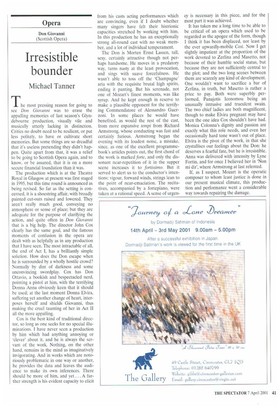Opera
Don Giovanni (Scottish Opera)
Irresistible bounder
Michael Tanner
The most pressing reason for going to see Don Giovanni was to erase the appalling memories of last season's Glyndebourne production, visually vile and musically utterly lacking in distinction. Critics no doubt need to be resilient, or put less politely, to have or cultivate short memories. But some things are so dreadful that it's useless pretending they didn't happen. Quite apart from that, it was a relief to be going to Scottish Opera again, and to know, or be assured, that it is on a more secure financial foundation than it was.
The production which is at the Theatre Royal in Glasgow at present was first staged in 1995, but this time round is announced as being revised. So far as the setting is concerned, it is a shoestring affair, with broadly painted cut-outs raised and lowered. They aren't really much good, conveying no atmosphere or sense of place; but they are adequate for the purpose of clarifying the action, and quite often in Don Giovanni that is a big help. The director John Cox clearly has the same goal, and the famous moments of confusion in the opera are dealt with as helpfully as in any production that I have seen. The most intractable of all, the end of Act I, has a brilliantly simple solution. How does the Don escape when he is surrounded by a wholly hostile crowd? Normally by dint of darkness and some unconvincing swordplay. Cox has Don Ottavio, a bookish and bespectacled nerd, pointing a pistol at him, with the terrifying Donna Anna obviously keen that it should be used; at the last moment Donna Elvira, suffering yet another change of heart, interposes herself and shields Giovanni, thus making the cruel taunting of her in Act II all the more appalling.
Cox is the best kind of traditional director, so long as one seeks for no special illuminations. I have never seen a production by him which had anything annoying or 'clever' about it, and he is always the servant of the work. Nothing, on the other hand, remains in the mind as imaginatively invigorating. And in works which are notoriously problematic in one way or another, he provides the data and leaves the audience to make its own inferences. There should be more of him, and yet ... A further strength is his evident capacity to elicit from his casts acting performances which are convincing, even if I doubt whether many singers have felt their histrionic capacities stretched by working with him. In this production he has an exceptionally strong all-round cast with no weak member, and a lot of individual temperament.
The Don is Morten Ernst Lassen, tall, sexy. certainly attractive though not perhaps handsome. He moves in a predatory way, turns nasty at the least provocation, and sings with suave forcefulness. He wasn't able to toss off the 'Champagne' aria with the requisite brutal high spirits, ending it panting. But his serenade, not one of Mozart's finest moments, was like syrup. And he kept enough in reserve to make a plausible opponent for the terrifying Commendatore of Alessandro Guerzoni. In some places he would have benefited, as would the rest of the cast, from more expansive tempi from Richard Armstrong, whose conducting was fast and certainly furious. Armstrong began the evening with its loudest noise, a mistake, since, as one of the excellent programmebook's articles points out, the first chord of the work is marked forte, and only the dissonant near-repetition of it in the supper scene increases it to fortissimo. But it served to alert us to the conductor's intentions: vigour, forward winds, strings lean to the point of near-emaciation. The recitatives, accompanied by a fortepiano, were taken at a rational speed. A sense of urgen
cy is necessary in this piece, and for the most part it was achieved.
It has taken me a long time to be able to be critical of an opera which used to be regarded as the apogee of the form, though I think it has been displaced, not least by the ever upwardly-mobile Cosi. Now I get slightly impatient at the proportion of the work devoted to Zerlina and Masetto, not because of their humble social status, but because they are not sufficiently central to the plot; and the two long scenes between them are scarcely any kind of development. One wouldn't want to sacrifice a bar of Zerlina, in truth, but Masetto is rather a price to pay. Both were superbly performed, Panajotis Iconomou being an unusually intrusive and truculent swain. The two chief ladies are both magnificent, though to make Elvira pregnant may have been the one idea Cox shouldn't have had. Monica Colonna's dignity and passion are exactly what this role needs, and even her occasionally hard tone wasn't out of place. Elvira is the pivot of the work, in that she crystallises our feelings about the Don: he deserves a fearful fate, but he is irresistible. Anna was delivered with intensity by Lyne Fortin, and for once I believed her in 'Non mi dir', where Armstrong at last relented.
If, as I suspect, Mozart is the operatic composer to whom least justice is done in our present musical climate, this production and performance went a considerable way towards repairing the damage.


























































 Previous page
Previous page